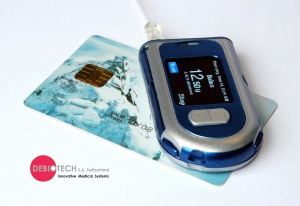Jun 24 2008
Debiotech and STMicroelectronics today introduced first evaluation prototypes of a unique miniaturized insulin-delivery pump. The tiny device can be mounted on a disposable skin patch to provide continuous insulin infusion, enabling substantial advancements in the availability, treatment efficiency and the quality of life of diabetes patients. The breakthrough Nanopump, which relies on microfluidic MEMS (Micro-Electro-Mechanical System) technology, has successfully passed initial testing stages and is now ready to enter volume manufacturing.

The highly miniaturized disposable insulin pump combines Debiotech's expertise in insulin delivery systems with ST's strengths in manufacturing high-volume silicon-based microfluidic devices. The Nanopump is less than one fourth the size of existing insulin-pump devices and can be worn as a nearly invisible patch on the skin.
Microfluidic technology also provides better control of the administered insulin doses, more closely mimicking the natural secretion of insulin from the pancreas, while detecting potential malfunctions of the pump to further protect patients.
As a disposable device, manufactured using high-volume semiconductor processing technologies, the MEMS-based Nanopump is also much more affordable, allowing the patient or the health system to avoid the substantial up-front investment typically associated with current pump solutions.
Insulin pump therapy, or Continuous Subcutaneous Insulin Infusion (CSII), is an increasingly attractive alternative to individual insulin injections that must be administered several times a day. With CSII, the patient is connected to a programmable pump including a storage reservoir, from which insulin is infused into the tissue under the skin throughout the day according to specific needs as programmed by the patient.
The insulin Nanopump, developed by Debiotech and industrialized by ST, represents the most advanced use of microfluidic MEMS technology in diabetes treatment.
"The success of the initial prototype tests has moved the revolutionary insulin Nanopump a step closer to market availability," said Benedetto Vigna, Group Vice President and General Manager of ST's MEMS and Healthcare, RF Transceivers and Sensors Division. "Working with our key partner Debiotech, we are readying a tiny piece of silicon that can make a huge difference to millions of diabetes patients around the world."
"This important milestone in the industrial production of the insulin Nanopump is a key achievement toward the successful launch of a new drug delivery device, combining the highest level of reliability and performance with an previously unmet level of convenience and safety for the patient," said Dr. Frederic Neftel, President and CEO of Debiotech. "The collaboration with ST has proven to be extremely efficient in time and achievements, allowing us to now concentrate on a future partnership with a leading medical device company who will be responsible to introduce the product on the market."
Additional information
There are almost 250 million people affected by diabetes worldwide and the number is expected to grow over the next decade due to population growth, ageing and life style. Without proper treatment, diabetes can lead to cardiovascular disease, kidney failure, blindness, nerve damage, and ultimately death. Diabetes is a leading cause of death in most developed countries.
The market for insulin pump therapy is growing rapidly: according to HSBC(1), the worldwide market for insulin pump therapy is expected to grow from $800 million in 2004 to $1.6 billion by 2009.